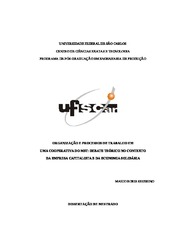Organização e processos de trabalho em uma cooperativa do MST: debate teórico no contexto da empresa capitalista e da economia solidária
Abstract
Historically, one verifies the appropriation of management tools for the attainement of plusvalue.
Among them, the ones related to the organization and the processes of work stand
out. However, it is noted that the appropriation of these management tools is carried out not
only by capitalist enterprises, but by enterprise of solidary economy (ESE) as well. This
master´s degree dissertation purpose is to analyze the common and specific characteristics
of the organization and the processes of work in their different models in the capitalist
enterprises and ESE. So, it was used a theoretical-empirical research through bibliographic
review to characterize the two variables in both social structures, and, through the case
study and the participative methodology, identify the specific characteristics of a type of
ESE, a cooperative of land reform, in this case, the Cooperativa de Produção Agropecuária
Vitória LTDA (COPAVI). In the bibliographic review, it was found that, for the attainment
of the plus-value in the capitalist economy, the organization and the processes of work are
subjected to constant changes, starting from the development of the method of capitalist
production, and among them, simple cooperation, manufacturing, machinery and
microelectronic automation, besides the taylorist, fordist, Italian, Swedish and Japanese
models, among others. In the EESs, changes also occur, but in the perspective of selfmanagement
and the subordination of the technical rationality to the social rationality,
through the cooperativism. In the comparative analysis performed, it was found that
cooperation is a commom factor for the two types of organization. The capitalist enterprises
use the concept of cooperation as simplification and parceling of work activities of each
worker for the complementation of the productive process, that is, the cooperation comes
through a management imposition. This kind of cooperation is alienating and subordinate,
and produces evolution and improvement as time goes by, through corporate
competitiveness. To the ESE, cooperation has the meaning of democratic management,
collective participation in the processes of work, of collective management and decision
making, that, as for the capitalist enterprises, undergo changes for a better insertion of their
products in the market. So, at COPAVI, the analysis focused the way changes occur in the
organization and work processes, oriented to the implementation of integrated
arrangements of productive chains, keeping the characteristics of cooperation as a
proposition of non-alienation of the worker. It should be emphasized that this dissertation
has not the purpose of creating a model, but show that it is possible to create and develop
alternatives for organization and work processes on the basis of self-management.
